| |
First
Person of Color in the United States to be elected governor
in 1875.
|
The first Person of Color
to serve as governer of a state was not Douglas Wilder, but
P.B.S. Pinchback.
His tenure as governor, however, was much
shorter than Wilder's. Pinchback had been elected president
pro tempore of the Louisiana senate in 1871 and promoted to
lieutenant governor upon the death of Oscar J. Dunn. Pinchback
was governor of Louisiana for just forty-six days, from December
9, 1872, to January 13, 1873, after the elected governor, Henry
Clay Warmouth, was impeached.
Pickney Benton Stewart Pinchback
1872-
Born: ...............May 10, 1837 in Macon, Georgia
Political Affiliation: ...........Republican
ReligiousAffiliation: African Methodist Episcopal
Education:.......... Gilmore School (Cincinnati); studied law at Straight University (New Orleans)
Career Prior to Term: Union Army Officer, Lt. Governor
How He Became Governor: Became acting Lt. Governor upon death of Dunn; became Governor upon suspension of Warmouth and then became the first African American to serve as a governor of a state of the United States
Career after Term: State Board of Education, Internal Revenue Agent, member of Southern University Board of Trustees
Died: December 21, 1921 in Washington, DC
Pinckney Benton Stewart Pinchback,
the son of a Mississippi white planter and a freed slave, became active in Republican Party politics in Louisiana as a delegate in the Republican state convention of 1867 and to the Constitutional Convention of 1868.
Pinchback became Lieutenant Governor under Henry Clay Warmoth when Oscar Dunn died. After Warmoth was impeached, Pinchback became Governor. He held office for only 35 days, but ten acts of the Legislature became law during that time.
After William Pitt Kellogg took office as a result of the controversial election of 1872, Pinchback continued his career, holding various offices including a seat on the State Board of Education, Internal Revenue agent and as a member of the Board of Trustees of Southern University.
Pinchback helped established Southern University when, in the Constitutional Convention of 1879, he pushed for the creation of a college for blacks in Louisiana.
Pinchback and his family moved to Washington and then New York where he was a Federal Marshal. He later moved back to Washington to practice law and died there in 1921. Pinchback is buried in Metairie.
Back
|
|
|
|
Pinchback was never able to reach the governor's mansion by
election, but he retired to Washington, D.C., where, along with
Blanche Bruce, he became a celebrity in Washington social circles.
Governer P.B.S Pinchback, was a former cabin boy, shrewd, capable,
vain, a gambling type, a man who would put everything on an
ace and, losing, walk away with a smile. Elliott was a dark-skinned
free person
of color
with a some what mysterious background.
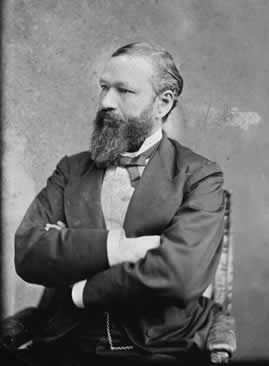
Compliments: Library of Congress |
|
* Pinchback was fair-skinned, the son of a Mississippi planter
and a colored woman who
bore him ten children.
Pinchback was of like mind: he was what he was. A congressional
investigating committee asked him if the governor acknowledged
his strength. Pinchback was frank. "Oh, yes; he always
acknowledged he couldn't get along without me. I have to tell
you the truth." Bold, elegantly turned out, daring, Pinchback
made his mark in reconstructed Louisiana. By turns a senator,
lieutenant governor and governor, he held more major offices
than any other person
of color in American history.
In the fall of 1872 he was elected to the U.S. House of Representatives.
In January, 1873, he was elected to the Senate. He went
to Washington, therefore, with the extraordinary distinction
of being both a congressman-elect. (There were also disquieting
rumors that Pinchback intended to make himself vice-president
elect.) Pinchback did not go as a beggar. "Sir," he
told the Senate, "I demand simple justice. I am not here
as a beggar. I do not care as far as I am personally concerned
whether you give me my seat or not. I will go back to my people
and come here but I tell you to preserve your own consistency.
Do not make fish of me while you make flesh of everybody else."
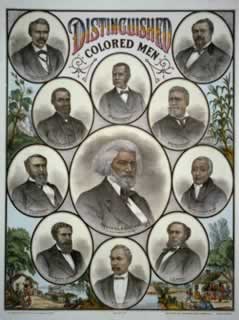
Compliments: Library of Congress
|
For three years the Senate
grappled with Pinchback's case. Almost the whole of an extra
session of Congress was devoted to the senator-elect from Louisiana.
Finally, after hours of debate, he was rejected. The real reason,
some authorities insist, was that the senators' wives told them
that they did not intend to associate with Mrs. Pinchback.
During
the controversy "Pinch," as he was called, became
a national figure. Washington women, charmed by his "Brazilian"
good looks, went out of their way to meet him and Pichback stories
made the rounds. The Washington correspondent of the New York
Commercial Advertiser was impressed by the senator-elect.
"Aside
from the political view of the question (two factions in Louisiana
were competing for national recognition),'' he wrote, "Pinchback's
presence in the United States Senate is not open to the smallest
objection, except the old Bourbon war-whoops of color. He
is about thirty-seven years of age, not darker than an Arab.
. . . His features are regular, just perceptibly African,
his eyes intensely black and brilliant, with a keen, restless
glance.
|
|
Click Photo to enlarge to read text |
|
His most repelletn point is a sardonic smile which, hovering
continuously over his lips, gives him an evil look, undeniably
handsome as the man is. It seems as though the scorn which
must rage within him, at sight of the dirty ignorant men from
the South who affect to look down upon him on account of his
color, finds play imperceptibly about his lips. . . Mr.
Pinchback is the best dressed Southern man we have had in
Congress from the South since the days when gentlemen were
Democrats."
More on Pinchback
 
|

Pinckney Benton Stewart Pinchback,
the 25th Governor of Louisiana and the first governor in the nation of African descent, died in 1921.
He is buried in the family tomb in Metairie Cemetery in New Orleans.
This bronze sculpture stands in the State Capitol building remarkably adjacent to the statue of Henry Watkins Allen. The plaque on the sculpture pedestal has this engraving:
The Honorable P. B. S. Pinchback
Governor State of Louisiana
1872
Presented by
The Baton Rouge Chapter of the Louisiana League of Good Government
July 30, 1976
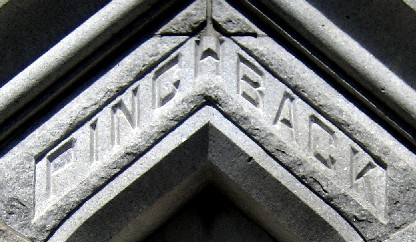
Pinchback was a state senator when, in 1871 Lt. Governor Oscar Dunn, a physician and also of African descent, died of pneumonia.
The senate elected Pinchback to the position of Lt. Governor.
Governor Henry Clay Warmoth was impeached at the end of his term in 1872.
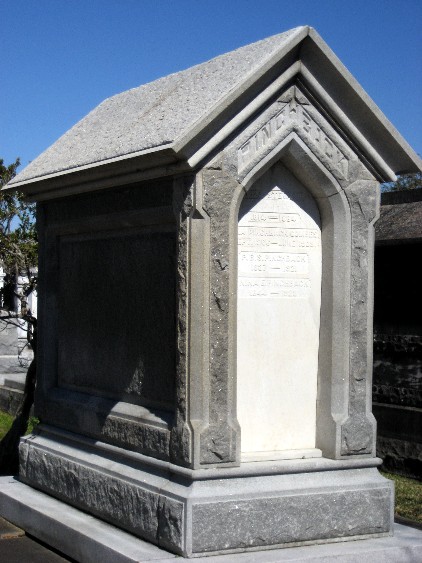
Pinchback became acting Governor after Governor Warmoth was required to step down until convicted of impeachment or until cleared of the charges.
As a result Governor Pinchback was in office for 35 days.
He was integral to the founding of Southern University. He became an attorney, practicing law in New York until his death in 1921. He was buried in this family tomb in Metairie Cemetery. Metairie Cemetery was previously reserved for whites only.
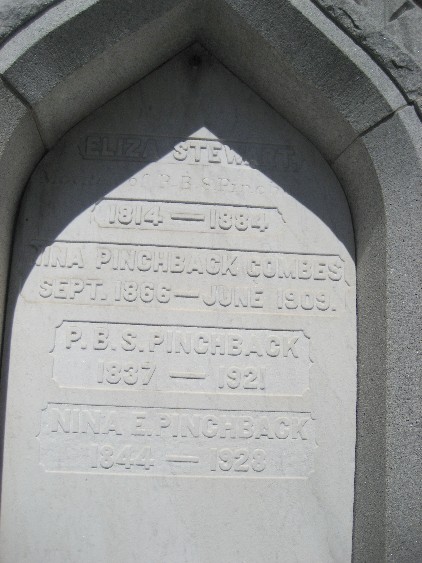
Eliza Stewart
Mother of P. B. S. Pinchback
1814 - 1884
Nina Pinchback Combs
Sept. 1886 - June 1909
P. B. S. Pinchback
1837 - 1921
Nina E. Pinchback
1844 - 1928

|
Favorite Biographies
|
All photos herein are DIGIMARC ENABLED, are the property of La-Cemeteries © and may
not be copied or distributed without the express written permission of
La-Cemeteries©
Copyright © 2007.
All Rights Reserved.

Digimarc and the Digimarc logo are registered trademarks of Digimarc Corporation.
The "Digimarc-Enabled" We
|
Source
|
|
